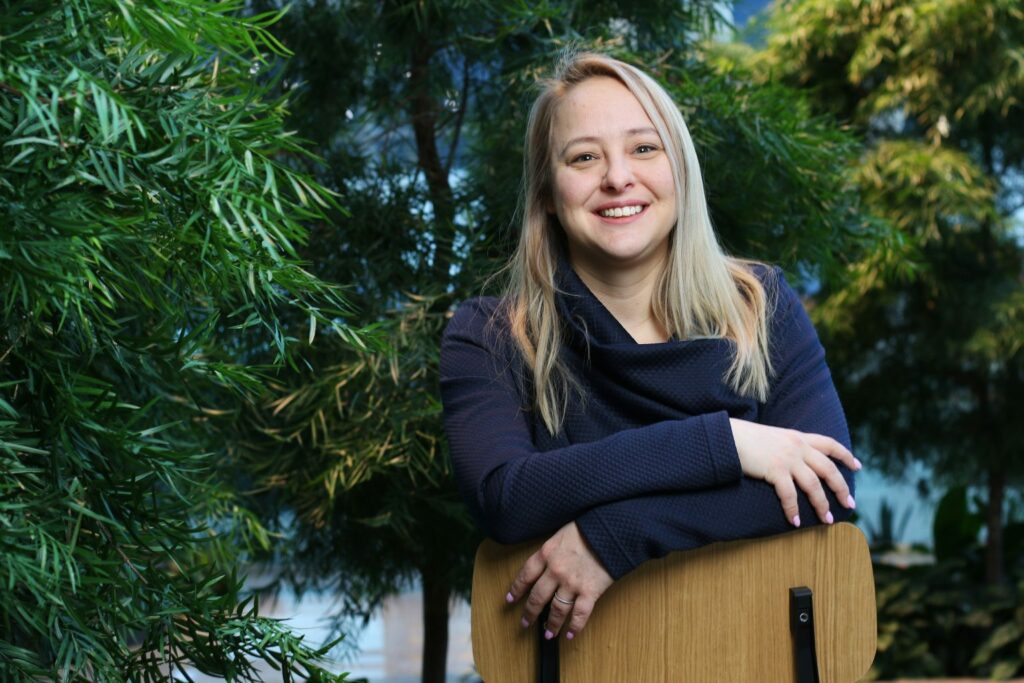‘Our ability to take lessons learned and bring them to these other countries cannot be overlooked’
Follow CEC on Linkedin CEC Linkedin
Follow CEC on Facebook CEC Facebook
Follow CEC on Twitter CEC Twitter

Beth (Hardy) Valiaho, vice-president of policy, regulatory and stakeholder relations with the International CCS Knowledge Centre. Photo by Dave Chidley for the Canadian Energy Centre
Canada may be a leader in carbon capture and storage, but Beth (Hardy) Valiaho isn’t going to the COP28 summit in Dubai to brag.
The vice-president of policy, regulatory and stakeholder relations for the International CCS Knowledge Centre based in Regina, Saskatchewan, says Canada’s role is to share the experience of how to successfully deploy CCS so it can be used to reduce emissions on a global scale.
“The value of taking the Canadian story to COP is being able to communicate how you can help these other countries,” Valiaho says.
“I think COP gives us a reason to reflect on the impact we can have globally. Our ability to take lessons learned and bring them to these other countries cannot be overlooked.”
Canada is one of only a few regions in the world to have large-scale CCS operations.
Since 2000, projects in Saskatchewan and Alberta have safely stored more than 52 million tonnes of CO2 that would have otherwise been emitted into the atmosphere.
These include the world’s first CCS facility on a coal-fired power plant at SaskPower’s Boundary Dam power station, and the largest-capacity CO2 pipeline on the planet, the Alberta Carbon Trunk Line.
The CO2 is captured from a variety of sources including coal power generation, oil processing, and fertilizer production, and transported by pipeline for permanent storage deep underground.
CCS development in Canada is accelerating. In Alberta, construction is well underway by Air Products on a new $1.6 billion net zero hydrogen complex using CCS that will support renewable diesel production.
Dow Chemical has announced it will proceed with a new $6.5 billion net zero petrochemical plant that will incorporate CCS to remove emissions while producing the base materials for everyday items like packaging and hygiene products.
Capital Power announced last December a limited notice to proceed for its $2.3 billion Genesee CCS project, and Heidelberg Materials continues to advance the world’s first CCS project on a cement plant in Edmonton.
And through the Pathways Alliance, the oil sands industry is advancing environmental assessments, early-stage engineering work and stakeholder engagement that is necessary to receive permits for construction for one of the world’s largest CCS projects.
Valiaho says the varied experience of carbon capture operations, as well as the regulatory and funding mechanisms that support development in Canada, is critically important as industries around the world seek to incorporate CCS.

Beth (Hardy) Valiaho, vice-president of policy, regulatory and stakeholder relations with the International CCS Knowledge Centre. Photo by Dave Chidley for the Canadian Energy Centre
“It’s not just plugging in a technology. Every situation is unique and different,” she says.
“Those are invaluable lessons that we can share that make or break these projects going forward.”
Dubai is the seventh COP for Valiaho, who holds a master’s degree in climate change law and is the former acting director of climate change for the government of Saskatchewan.
At the event, expected to draw up to 70,000 people from around the world, the Knowledge Centre is co-hosting the official side event on CCS, along with several other panel discussions that will explore a wide range of CCS topics.
“What I encourage is that we have this global view at COP as opposed to how are we meeting Canada’s targets. This is also very key and an important thing that journalists and Canadians are very focused on, but there’s a bigger message that can be delivered,” Valiaho says.
She says CCS development supports so-called intergenerational equity.
“It’s about giving rights to people in the future who are not here today to defend themselves, which is really similar to the Indigenous Seven Generations principle,” says Valiaho, who grew up in Newfoundland and has a strong connection to the environment through her Indigenous heritage.
“[CCS] relates to the transition of trying to figure out how to make solutions for the future. We can’t just shut everything down today. There’s a long lead time required for CCS development and there are important social and economic aspects for communities that we need to consider in all of this.”
The unaltered reproduction of this content is free of charge with attribution to Canadian Energy Centre Ltd.
Share This:




